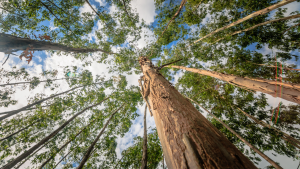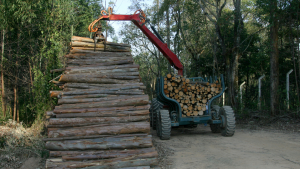Harvesting Change: The Case for Eucalyptus in Building Decarbonization and CO2 Removal
BamCore's Eucalyptus Research Reveals Path to Lower Carbon Emissions with Eucalyptus as a Building Materials Feedstock
WINDSOR, CALIFORNIA, UNITED STATES, October 16, 2023 /EINPresswire.com/ -- BamCore releases its latest whitepaper, “Eucalyptus: An Overlooked Resource for CO2 Removal and Building Decarbonization.” This innovative research showcases the environmental and socioeconomic advantages of utilizing Eucalyptus as a sustainable solution for the construction industry. Eucalyptus is the second most extensively planted tree worldwide, yet its potential as a feedstock for building materials often goes unnoticed. By shedding light on this underutilized resource, we can effectively tackle the challenges induced by climate change.
From an environmental perspective, utilizing this fast-growing biogenic material offers numerous benefits. Eucalyptus can tolerate low soil fertility and acidic soils, contribute to soil stabilization, and even reduce salination on degraded lands. Eucalyptus plantations can also function as foster ecosystems, promoting the regeneration of native species and providing habitats for biodiversity. Additionally, this biogenic building material can be used in agroforestry systems, increasing crop yields and helping to replenish above and below-ground organic matter.
Socioeconomically, Eucalyptus provides opportunities for rural farmers to generate income and serve as a buffer against financial crises. It is a high-value cash crop that can generate more income than many agricultural crops. Selling Eucalyptus poles and products can help reduce poverty, increase food security, and diversify smallholder farming systems.
Kate Chilton, Chief Sustainability Officer at BamCore, said, “We were thrilled to uncover the powerful opportunity Eucalyptus presents to decarbonize the built environment and are excited to present our findings of this research. Returning to first principles, we looked at fast-growing fibers found in nature, and the speed and strength of Eucalyptus made it a no-brainer! Found all over the world, Eucalyptus can be used in buildings everywhere to have a truly global impact.”
Eucalyptus presents a sustainable and innovative solution for building decarbonization. With its fast growth rate, high carbon capture potential, and superior mechanical properties, Eucalyptus is an ideal choice for engineered wood products and other sustainable building materials. The environmental and socioeconomic benefits it brings, along with its ability to contribute to carbon dioxide removal, make it a powerful tool in the fight against climate change. By embracing Eucalyptus as a driver for CO2 removal and building decarbonization, we can create a more sustainable and resilient future for the construction industry.
Tobe Sheldon
BamCore
+1 707-737-0288
email us here
Visit us on social media:
Facebook
Twitter
LinkedIn
Instagram
YouTube
Legal Disclaimer:
EIN Presswire provides this news content "as is" without warranty of any kind. We do not accept any responsibility or liability for the accuracy, content, images, videos, licenses, completeness, legality, or reliability of the information contained in this article. If you have any complaints or copyright issues related to this article, kindly contact the author above.


